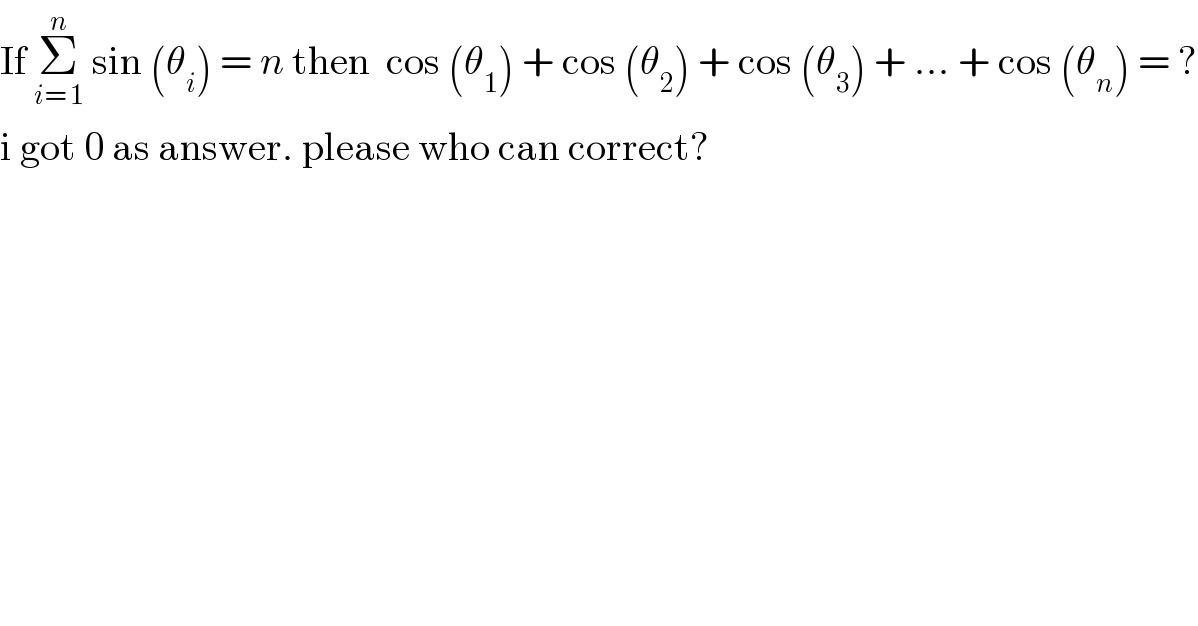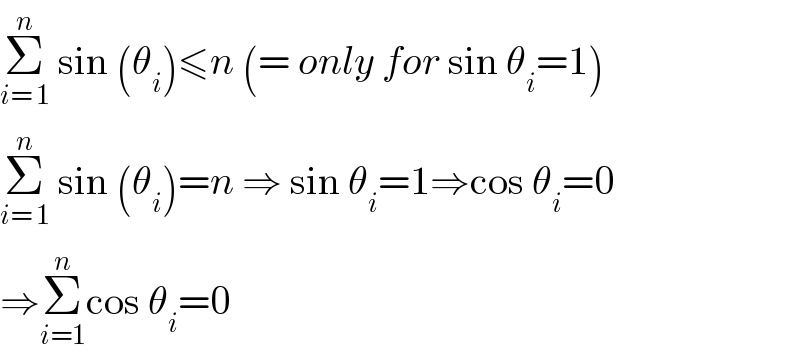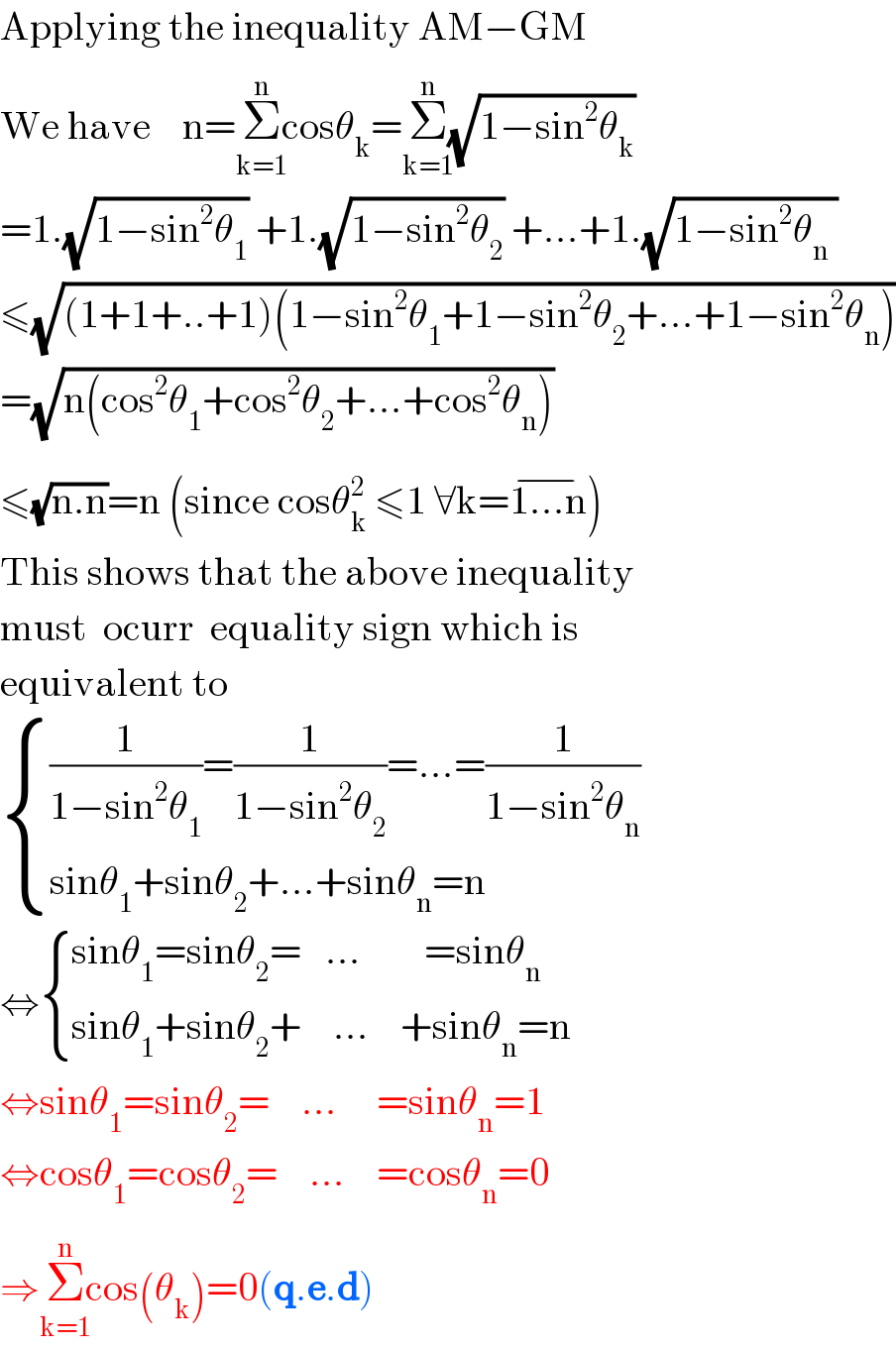
Question Number 106944 by Rio Michael last updated on 08/Aug/20

$$\mathrm{If}\:\underset{{i}=\:\mathrm{1}} {\overset{{n}} {\sum}}\:\mathrm{sin}\:\left(\theta_{{i}} \right)\:=\:{n}\:\mathrm{then}\:\:\mathrm{cos}\:\left(\theta_{\mathrm{1}} \right)\:+\:\mathrm{cos}\:\left(\theta_{\mathrm{2}} \right)\:+\:\mathrm{cos}\:\left(\theta_{\mathrm{3}} \right)\:+\:...\:+\:\mathrm{cos}\:\left(\theta_{{n}} \right)\:=\:? \\ $$$$\mathrm{i}\:\mathrm{got}\:\mathrm{0}\:\mathrm{as}\:\mathrm{answer}.\:\mathrm{please}\:\mathrm{who}\:\mathrm{can}\:\mathrm{correct}? \\ $$
Commented by mr W last updated on 08/Aug/20

$$\underset{{i}=\:\mathrm{1}} {\overset{{n}} {\sum}}\:\mathrm{sin}\:\left(\theta_{{i}} \right)\leqslant{n}\:\left(=\:{only}\:{for}\:\mathrm{sin}\:\theta_{{i}} =\mathrm{1}\right) \\ $$$$\underset{{i}=\:\mathrm{1}} {\overset{{n}} {\sum}}\:\mathrm{sin}\:\left(\theta_{{i}} \right)={n}\:\Rightarrow\:\mathrm{sin}\:\theta_{{i}} =\mathrm{1}\Rightarrow\mathrm{cos}\:\theta_{{i}} =\mathrm{0} \\ $$$$\Rightarrow\underset{{i}=\mathrm{1}} {\overset{{n}} {\sum}}\mathrm{cos}\:\theta_{{i}} =\mathrm{0} \\ $$
Commented by Rio Michael last updated on 08/Aug/20

$$\mathrm{thanks}\:\mathrm{to}\:\mathrm{you}\:\mathrm{both}\:\mathrm{sirs} \\ $$
Answered by 1549442205PVT last updated on 08/Aug/20

$$\mathrm{Applying}\:\mathrm{the}\:\mathrm{inequality}\:\mathrm{AM}−\mathrm{GM} \\ $$$$\mathrm{We}\:\mathrm{have}\:\:\:\:\mathrm{n}=\underset{\mathrm{k}=\mathrm{1}} {\overset{\mathrm{n}} {\Sigma}}\mathrm{cos}\theta_{\mathrm{k}} =\underset{\mathrm{k}=\mathrm{1}} {\overset{\mathrm{n}} {\Sigma}}\sqrt{\mathrm{1}−\mathrm{sin}^{\mathrm{2}} \theta_{\mathrm{k}} } \\ $$$$=\mathrm{1}.\sqrt{\mathrm{1}−\mathrm{sin}^{\mathrm{2}} \theta_{\mathrm{1}} }\:+\mathrm{1}.\sqrt{\mathrm{1}−\mathrm{sin}^{\mathrm{2}} \theta_{\mathrm{2}} }\:+...+\mathrm{1}.\sqrt{\mathrm{1}−\mathrm{sin}^{\mathrm{2}} \theta_{\mathrm{n}} \:} \\ $$$$\leqslant\sqrt{\left(\mathrm{1}+\mathrm{1}+..+\mathrm{1}\right)\left(\mathrm{1}−\mathrm{sin}^{\mathrm{2}} \theta_{\mathrm{1}} +\mathrm{1}−\mathrm{sin}^{\mathrm{2}} \theta_{\mathrm{2}} +...+\mathrm{1}−\mathrm{sin}^{\mathrm{2}} \theta_{\mathrm{n}} \right)} \\ $$$$=\sqrt{\mathrm{n}\left(\mathrm{cos}^{\mathrm{2}} \theta_{\mathrm{1}} +\mathrm{cos}^{\mathrm{2}} \theta_{\mathrm{2}} +...+\mathrm{cos}^{\mathrm{2}} \theta_{\mathrm{n}} \right)} \\ $$$$\leqslant\sqrt{\mathrm{n}.\mathrm{n}}=\mathrm{n}\:\left(\mathrm{since}\:\mathrm{cos}\theta_{\mathrm{k}} ^{\mathrm{2}} \:\leqslant\mathrm{1}\:\forall\mathrm{k}=\overline {\mathrm{1}...\mathrm{n}}\right) \\ $$$$\mathrm{This}\:\mathrm{shows}\:\mathrm{that}\:\mathrm{the}\:\mathrm{above}\:\mathrm{inequality} \\ $$$$\mathrm{must}\:\:\mathrm{ocurr}\:\:\mathrm{equality}\:\mathrm{sign}\:\mathrm{which}\:\mathrm{is} \\ $$$$\mathrm{equivalent}\:\mathrm{to} \\ $$$$\begin{cases}{\frac{\mathrm{1}}{\mathrm{1}−\mathrm{sin}^{\mathrm{2}} \theta_{\mathrm{1}} }=\frac{\mathrm{1}}{\mathrm{1}−\mathrm{sin}^{\mathrm{2}} \theta_{\mathrm{2}} }=...=\frac{\mathrm{1}}{\mathrm{1}−\mathrm{sin}^{\mathrm{2}} \theta_{\mathrm{n}} }}\\{\mathrm{sin}\theta_{\mathrm{1}} +\mathrm{sin}\theta_{\mathrm{2}} +...+\mathrm{sin}\theta_{\mathrm{n}} =\mathrm{n}}\end{cases} \\ $$$$\Leftrightarrow\begin{cases}{\mathrm{sin}\theta_{\mathrm{1}} =\mathrm{sin}\theta_{\mathrm{2}} =\:\:\:...\:\:\:\:\:\:\:\:=\mathrm{sin}\theta_{\mathrm{n}} }\\{\mathrm{sin}\theta_{\mathrm{1}} +\mathrm{sin}\theta_{\mathrm{2}} +\:\:\:\:...\:\:\:\:+\mathrm{sin}\theta_{\mathrm{n}} =\mathrm{n}}\end{cases} \\ $$$$\Leftrightarrow\mathrm{sin}\theta_{\mathrm{1}} =\mathrm{sin}\theta_{\mathrm{2}} =\:\:\:\:...\:\:\:\:\:=\mathrm{sin}\theta_{\mathrm{n}} =\mathrm{1} \\ $$$$\Leftrightarrow\mathrm{cos}\theta_{\mathrm{1}} =\mathrm{cos}\theta_{\mathrm{2}} =\:\:\:\:...\:\:\:\:=\mathrm{cos}\theta_{\mathrm{n}} =\mathrm{0} \\ $$$$\Rightarrow\underset{\mathrm{k}=\mathrm{1}} {\overset{\mathrm{n}} {\Sigma}}\mathrm{cos}\left(\theta_{\mathrm{k}} \right)=\mathrm{0}\left(\boldsymbol{\mathrm{q}}.\boldsymbol{\mathrm{e}}.\boldsymbol{\mathrm{d}}\right)\: \\ $$
